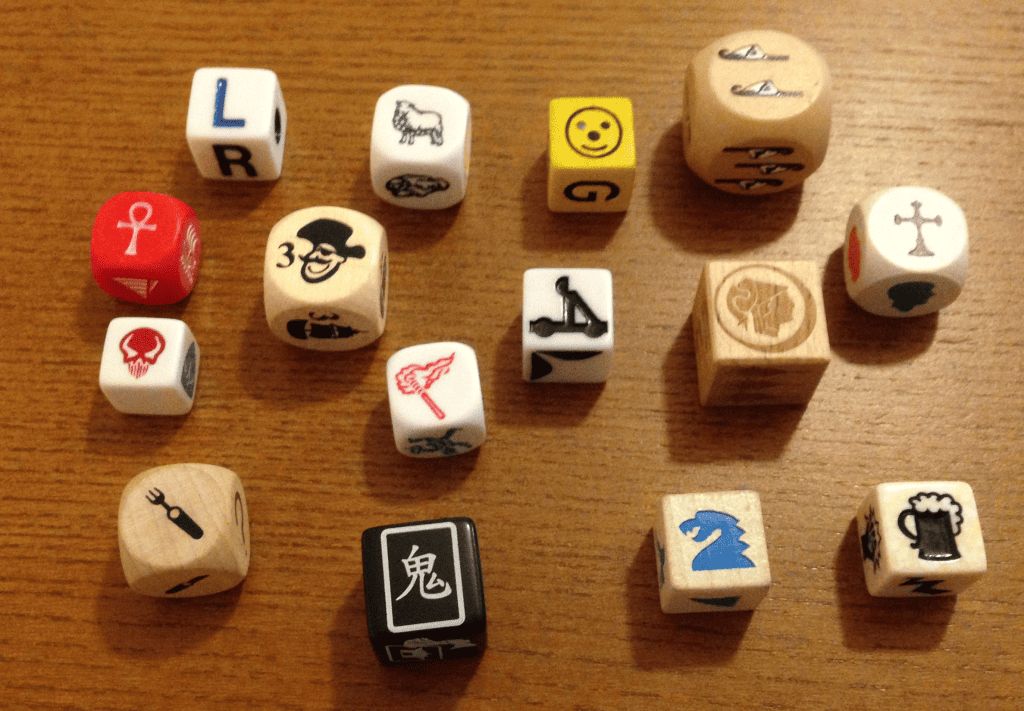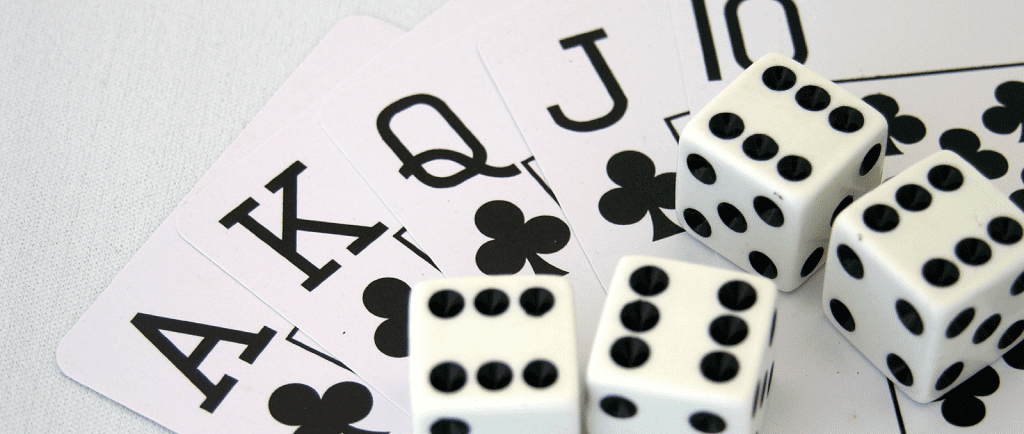
WHAT’S THE DIFFERENCE BETWEEN ROLLING A DIE AND DRAWING A CARD? MAYBE MORE THAN YOU REALIZE.
In my day job, I design casino games, so I spend a lot of time around cards, dice, and other instruments of randomness. Rolling a die is a classic example of picking with replacement, meaning the pool of possible outcomes remains the same from pick to pick. Drawing a card is a classic example of picking without replacement, meaning the pool of outcomes dwindles with each pick. This difference alone leads to many benefits and drawbacks for dice and cards. The next time you are trying to choose the right mechanic for your game, here are some things to consider:
ROLLING A DIE
BENEFITS
STREAKS ARE POSSIBLE.
Yes, you could keep rolling double sixes! Ever play craps? It can be crazy fun if the current shooter is on a hot streak. It’s hard to get that “hot streak” feeling from cards.
MORE TRUSTWORTHY
Cards have to be shuffled to be random, but a die is instantly ready. There are no questions about whether the die was “shuffled enough”. Try this test. If someone offered you a 50/50 chance to win $100, would you rather roll a 1, 2, or 3 on a die, or draw a red card from a shuffled standard deck? Probably, you would choose to roll the die. Who knows how the cards were shuffled? How well do you trust the person who shuffled the cards? Are there any cards missing? The die just comes with less baggage.
EASY TO SEE ALL POSSIBLE OUTCOMES AND THEIR RELATIVE ODDS
Want to know what outcomes you can get on a die? Just pick it up and look at every side. If a symbol appears on multiple sides, you can easily understand the better odds for that outcome.
ROLLING IS MORE FUN THAN DRAWING
Cards just don’t have that same level of physical appeal. It feels like you have a better chance at controlling your destiny by rolling a die than simply drawing the next card from the top of your deck.
WHO DOESN’T LOVE CHUCKING A HUGE WAD OF DICE?
DRAWBACKS
NO OUTCOME IS GUARANTEED TO HAPPEN, OR MAY OCCUR AT AN UNEXPECTED FREQUENCY
Ever had a night when the dice just didn’t go your way? While it’s fun to roll double sixes six times in a row, it’s equally frustrating to roll snake eyes consistently. Dice can frustrate gamers to no end if they played perfect strategy but the dice consistently went against them.
NUMBER OF POSSIBLE OUTCOMES IS LIMITED TO THE SIDES OF THE DIE
The standard die obviously only has six sides, so there are only so many outcomes you can get from a die. You could certainly change the die you are using to a D10 or a D20, but the sides will get smaller and smaller, so custom dice with so many sides would likely be impractical.
THE OUTCOMES ARE BAKED INTO THE DIE AND IMPOSSIBLE TO CHANGE
Want to change the odds of certain outcomes happening mid-game? That’s hard to do with dice given their fixed nature. You would need the help of other components.
A DIE CAN NEVER OFFER MORE FAVORABLE ODDS
A die can never be in a “juiced” state where better outcomes are more likely. That’s because a die has no concept of previous history while a deck of cards does.
MITIGATING THE LUCK OF THE DIE
REROLLS
Yahtzee is the most famous dice game where you get up to 3 rerolls on your dice before your dice are locked. That mechanic has been used far and wide, most notable in games like King of Tokyo.
EARN MORE DICE
Games such as Roll through the Ages and To Court the King let you earn more dice over the course of the game. Obviously, the more dice you roll, the better chance you will get what you want.
ADJUSTING A RESULT
Don’t like the way dice rolled? There are lots of games that allow players to modify the die result, usually be +1 / -1. A game like Eldritch Horror allows players to gain equipment and allies which automatically improve dice rolls. A game like Castles of Burgundy let players spend a worker to change a die roll by 1.
DRAFTING DICE
In some games, a pool of dice are rolled and players take turns drafting from that pool, such as Yspahan. In other games, you can choose which custom dice to add to your pool of dice such as Quarriors. In Formula D, you can choose which type of die to roll (D6, D10, D20, etc.) and that affects how fast you go, but also how likely you are to crash your race car.
MULTIPLE USES
In some games, there are many uses for a given die, some requiring a low number and others a high number. In this way, any roll could be a good roll as it could be good for at least one kind of action. I like how many ways dice can be used in the Castles of Burgundy and higher or lower numbers are not necessarily better.
Challenge: Which games are these custom dice from? Answers on a later post.
DRAWING A CARD
BENEFITS
ALL OUTCOMES ARE GUARANTEED TO HAPPEN AT SOME POINT AND OCCUR WITH EXPECTED FREQUENCY
If you have a killer card in your deck, you know it’s guaranteed to appear in your hand eventually. That’s a big difference with a die. If your killer move is on a die face, that die face may never be rolled.
THE REMAINING ELEMENTS IN THE DECK MAY BE EXTRA FAVORABLE
Ever play Dominion and realize you haven’t seen your best cards yet? As the deck dwindles and your best cards still haven’t appeared, you realize your next few hands will be epic. That can provide a lot of anticipation as you draw each new card into your hand.
OFFERS GREATER POSSIBILITY OF VARIABILITY—PUT ANY NUMBER OF DIFFERENT CARDS IN THE DECK THAT YOU WANT
Designing a card game offers tons of flexibility compared to a dice game. You want to add a new outcome type—just throw a new card in the deck. You can easily add and remove cards.
EASY TO CHANGE ODDS ON THE FLY—GAIN ANOTHER CARD IN YOUR DECK
Want to make something more frequent in a card game you are designing? Just throw another card of that type into the deck. You can fine tune the odds of various cards by changing the numbers of various cards and increasing or decreasing the overall deck size. That sort of fine tuning is much harder to do with dice.
DRAWBACKS
STREAKS ARE NOT POSSIBLE
If you have one Super Attack card in your deck, there’s no way you can draw that same card three times in a row. Once you play it, it’s in your discard pile, so you cannot get the super streaks like from rolling a die.
LESS TRUSTWORTHY
Ever been to a magic show? How many card tricks have you seen where a magician alters a deck of cards in some way to make something surprising happen. Yes, cards can be more easily hacked than a die. If a die is fair, there’s not really a way to make it unfair especially since everyone can watch a die being rolled.
IF A DECK OF CARDS IS FAIR, IT CAN BE MADE UNFAIR IN THE HANDS OF A CARD SHARK.
MAY BE HARD TO GROK THE ODDS OF ALL THE POSSIBLE OUTCOMES
Ever play a new game with lots of unfamiliar cards? Maybe you’re asking yourself—how frequent is this card or that card? Even if you examine a deck of cards to a new game, it’s not easy to get a sense of how often various outcomes happen and that gets truer the larger the deck of cards.
THE REMAINING ELEMENTS IN THE DECK MAY BE EXTRA UNFAVORABLE
If you just had an epic hand with all your best cards, you know your next hand is likely to be much less exciting. In fact, the remaining cards in your deck may be downright awful and there is nothing you can do about it until you shuffle your deck again.
MITIGATING THE LUCK OF THE DRAW
HAND SIZE
The larger the hand size, the less impact randomness will have on the game. But once hand size gets too big, players might start to get AP issues. It’s also hard to hold lots of cards in your hand.
DRAFTING CARDS
Instead of drawing cards randomly from a deck, players could build their hand by choosing from face up cards such as in Ticket to Ride or Taj Mahal.
MULTIPLE SOURCES
In some games players can get cards not just by drawing them, but also by stealing them like Settlers of Catan, or taking the top card from the discard pile, like Evolution Progress of Technology. By expanding the ways in which players get cards, it’s more likely they may get what they want.
DECKBUILDING
Dominion and its brethren games let players choose what type of cards to add to their decks and how many of each type of card. Players can fine tune the odds of individual cards coming up based on their deck size and composition.
MULTIPLE USES
It’s all the game design rage to have cards with lots of potential uses, a trend started by Glory to Rome where each card can be used in four different ways. Usually this involves having multiple attributes on a card and the player decides which of the attributes to tap.
For more discussion on dice vs. cards, see Brad Brooks’ piece: Transmorgify your Mechanics.
For more information on probability, see James Ernest’s piece: Probability for Game Desginers.







